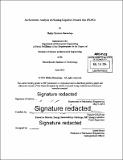An economic analysis of Floating Liquefied Natural Gas (FLNG)
Author(s)
Marmolejo, Phillip Christian
DownloadFull printable version (6.179Mb)
Other Contributors
Massachusetts Institute of Technology. Department of Mechanical Engineering.
Advisor
Francis O'Sullivan.
Terms of use
Metadata
Show full item recordAbstract
This report includes a discussion of the potential production of stranded natural gas reserves through the implementation of Floating Liquefied Natural Gas (FLNG) in a world of growing energy demand followed by an analysis of the technology's economic feasibility. The economic analysis aims to use production and expense estimates related to Shell's Prelude FLNG project in order to determine the project's FOB breakeven price. The net present value (NPV) of the project's discounted future cash flows is used to determine this breakeven price. The results of the economic analysis revealed the FOB breakeven price of Shell's Prelude project to be $8.16 per MMBTU, a reasonable calculation given current breakeven price estimates for similar projects in the area. Even with a 15% error band in Shell's production estimates, the breakeven price remained in the range of $8-$9 per MMBTU. However, when the production of lean natural gas was considered, the breakeven price exceeded $12 per MMBTU, a price that is, based upon current forecasts, too high to warrant consideration of such a project. It was found that with production incentives, such as LPG and condensate, the current FLNG design can prove to be economically successful, given the current LNG price forecasts. However, for the production of stranded reserves lacking these production incentives, a separate lean FLNG design should be considered.
Description
Thesis: S.B., Massachusetts Institute of Technology, Department of Mechanical Engineering, 2014. Cataloged from PDF version of thesis. Includes bibliographical references (pages 67-68).
Date issued
2014Department
Massachusetts Institute of Technology. Department of Mechanical EngineeringPublisher
Massachusetts Institute of Technology
Keywords
Mechanical Engineering.